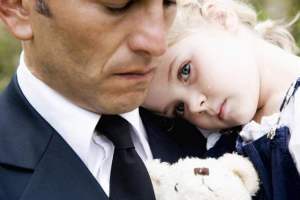Death is a part of life; its a reality that everyone has to face. Although loosing a loved one is a natural part of life, the flood of emotions and instability that accompany a person after a loss can run deep, even if a loss is expected. For children this is a hard concept to grasp. They will most likely feel fear and sadness about loosing someone but its hard for them to connect all of the dots associated with such a traumatic event. They may not be able to wrap their minds around the true meaning of death. If a loved one that has passed was close to your child, they were probably close to you as well which means while your child is grieving so are you. You may feel that its hard to talk about loss and grief with your child because of your own instability or fear that your child will not understand. You may avoid talking about it or you may feel like distancing yourself from the situation. These are natural tendencies but the best way to help you and your child understand grief and loss is by being open about death, expressing your feelings and keeping your child close.
 |
| Photo 1 |
Dr. Brazelton in his book Touchpoints says, "Children know all to well when a parent is depressed or is in a crisis. Attempts to hide the event or the feelings it engenders amount to a desertion for the child...it is better for a child to learn about a death from her own grieving parents than it is to experience a parent's withdrawal without having been given a reason for it...If parents withdraw without sharing the experience they are having, it is confirmation of the child's worst fears: Grandma has died. Now mother is so sad that maybe she will die too."
 |
| Photo 2 |
Depending on the child's age, the level of understanding will differ. It's important to tailor explanations about loss and grief to your child's age but realize there will be concepts that are difficult to understand regardless of the childs age. Dr. Brazeton suggests these responses to some of the questions children might ask:
"Grandpa was getting so old that he wasn't able to do all the things he wanted to do. When you get old, you get pretty tired. Now he can rest."
"None of us know why someone we love has to die and go away. The body just gives out. We all feel terribly sad and lonely. We hate to give them up but what I plan to do is remember all I can about them. I'd like to talk about all the things we can remember about them, so we can keemp them with us that way. Can you remember somethings about them to tell me now?"
0 Response to "Helping Children Understand Loss and Grief - Best Baby Strollers "
Posting Komentar